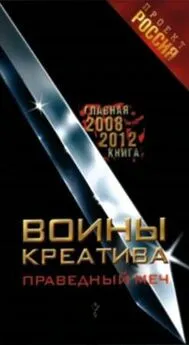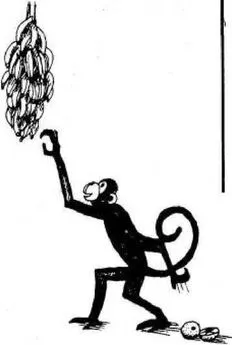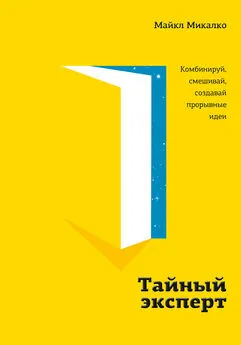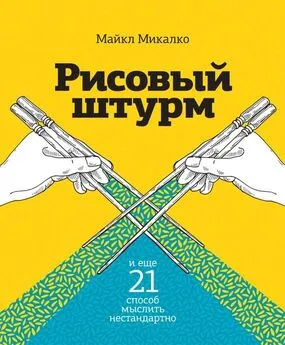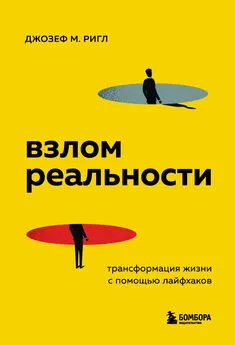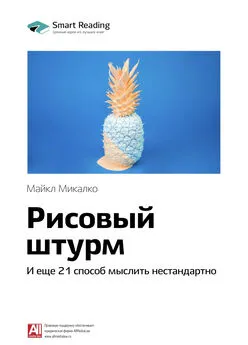Майкл Микалко - Взлом креатива
- Название:Взлом креатива
- Автор:
- Жанр:
- Издательство:Манн, Иванов и Фербер
- Год:2015
- ISBN:9785000576465
- Рейтинг:
- Избранное:Добавить в избранное
-
Отзывы:
-
Ваша оценка:
Майкл Микалко - Взлом креатива краткое содержание
Взлом креатива - читать онлайн бесплатно ознакомительный отрывок
Интервал:
Закладка:
Hoffmann, Banesh, and Helen, Dukas. Albert Einstein: Creator and Rebel. New York: NAL-Dutton, 1973.
Holton, G., and Y. Elkana, eds. Albert Einstein: Historical and Cultural Perspectives. Princeton, NJ: Princeton University Press, 1982.
—. “On Trying to Understand Scientific Genius.” The American Scholar 41 (1971): 98–99.
—. Thematic Origins of Scientific Thought: Kepler to Einstein , reprint ed. Cambridge, MA: Harvard University Press, 1988.
Homer, Willliam. Seurat and the Science of Painting , reprint ed. New York: Hacker Art Books, 1985.
Horgan, Paul. Encounters with Stravinsky , reprint ed. Middletown, CT: Wesleyan University Press, 1989.
Horn, J. “Human Abilities: A Review of Research and Theory in the Early 1970s.” Annual Review of Psychology 27 (1976): 437–485.
Infeld, Leopold. Albert Einstein: His Work and Its Influence on Our World. New York: Scribner’s, 1950.
Jackson, Douglas, and J. Rushton, eds. Scientific Excellence. Beverly Hills, CA: Sage Publications, 1987.
James, William. “Great Men, Great Thoughts, and the Environment. Atlantic Monthly 46 (1880): 441–459.
Jansson, D. G., and S. M, Smith. “Design Fixation.” Design Studies 12 (1) (1987): 3–11.
Jenkins, R. “Elements of Style: Continuities in Edison’s Thinking.” Annals of the New York Academy of Sciences 424 (1983): 149–162.
Jones, E. The Life and Work of Sigmund Freud. New York: Basic Books, 1961 (Джонс Э. Жизнь и творения Зигмунда Фрейда. М.: Наука, 1997).
Judson, Horace. The Eighth Day of Creation: Makers of the Revolution in Biology. Plainview, NY: Cold Spring Harbor, 1996.
Koestler, Arthur. The Act of Creation. New York: Viking Penguin, 1990.
Kohler, Wolfgang. The Task of Gestalt Psychology. Ann Arbor, MI: Books on Demand (Келер В., Коффка К. Гештальт-психология. М.: АСТ, 1998).
Landrum, Gene. Profiles of Genius. New York: Prometheus Books, 1993 (Ландрам Дж. Профили гениев. Ростов-на-Дону: Феникс, 1997).
Lorenz, Konrad. “The Role of Gestalt Perception in Animal and Human Behavior.” In Aspects of Form , edited by L. Whyte, pp. 157–178. Bloomington, IN: Midland Books, 1966.
Macfarlane, Gwen. Alexander Fleming: The Man and the Myth. Cambridge, MA: Harvard University Press, 1984.
Mednick, S. “The Associative Basis of the Creative Process,” Psychological Review 69 (1962): 220–232.
Miller, Arthur I. Insights of Genius. New York: Springer-Verlag New York, 1996.
Mumford, M. D., and S. B. Gustafson. “Creativity Syndrome: Integration, Application, and Innovation.” Psychological Bulletin 103 (1) (1988): 27–43.
Murphy, G. L. “Comprehending Complex Concepts.” Cognitive Science 12 (1988): 529–562.
Ochse, R. Before the Gates of Excellence: The Determinants of Creative Genius. New York: Cambridge University Press, 1990.
Ortony, Andrew, ed. Metaphor and Thought , second ed. New York: Cambridge University Press, 1993.
Osborn, A. Applied Imagination. New York: Charles Scribner’s Sons, 1953.
Peat, David. In Search of Nikola Tesla. Bath: Ashgrove UK, 1997.
Perkins, David N. The Mind’s Best Work. Cambridge, MA: Cambridge University Press, 1981 (Перкинс Д. Как стать гением, или Искусство взрывного мышления. М.: АСТ, 2003).
—. “The Possibility of Invention.” In The Nature of Creativity: Contemporary Psychological Perspectives , edited by R. J. Sternberg. Cambridge, MA: Cambridge University Press, 1988.
Piaget, Jean. The Child’s Conception of the World , reprint ed. Totowa, NJ: Littlefield, Adams, 1983 (Пиаже Ж. Речь и мышление ребенка. М.: Римис, 2008).
Poe, Richard. The Einstein Factor. Rocklin, CA: Prima Publishing, 1995 (Вин В., По Р. Как развить феноменальную память, или Фактор Эйнштейна. Минск: Попурри, 2005).
Popper, Karl. The Logic of Scientific Discovery , fourteenth ed. New York: Routledge, 1996 (Поппер К. Логика научного исследования. М.: Республика, 2004).
Pyenson, Lewis. The Young Einstein. Philadelphia: IOP Pub., 1995.
Reed, S. G. Ernst, and R. Banerjii. “The Role of Transfer Between Similar Problem States.” Cognitive Psychology 6 (1974): 436–450.
Richards, Robert J. The Meaning of Evolution. Chicago: University of Chicago Press, 1992.
Rothenberg, Albert. “Artistic Creation As Stimulated by Superimposed Versus Combined-Opposite Visual Images.” Journal of Personality and Social Psychology 50 (1986): 370–381.
—, and Carl Hausman, eds. The Creativity Question. Durham, NC: Duke University Press, 1976.
—. The Etrierging Goddess: The Creative Process in Art, Science and Other Fields. Chicago: University of Chicago Press, 1989.
Runes, Dagobert, ed. The Diary and Sundry Observations of Thomas Aha Edison , reprint ed. New York: Greenwood Press, 1968.
Russell, Bertrand. Basic Writings of Bertrand Russell. New York: Simon & Schuster, 1961 (Рассел Б. Искусство мыслить. М.: Идея-пресс; Дом интеллектуальной книги, 1999).
Schapiro, Meyer. Paul Cezanne. New York: Harry N. Abrams, 1983. Senge, Peter. The Fifth Discipline. New York: Doubleday, 1990.
Seward, A. C. Darwin and Modern Science. Cambridge, MA: Cambridge University Press, 1909.
Shrady, Maria. Moments of Insight. New York: Harper & Row, 1972.
Simonton, Dean K. “Genius and Chance: A Darwinian Perspective.” In Creativity , edited by J. Brockman.
—. Scientific Genius. New York: Cambridge University Press, 1988.
—. “Emergence and Realization of Genius: The Lives and Works of 120 Classical Composers.” Journal of Personality and Social Psychology 60 (1991): 607–619.
—. “Foresight in Insight? A Darwinian Answer.” In The Nature of Insight , edited by R. J. Sternberg and J. E. Davidson. Cambridge, MA: MIT Press, 1992.
—. Greatness, Who Makes History and Why , New York: The Guilford Press, 1994.
—. Genius, Creativity and Leadership. Cambridge, MA: Harvard University Press, 1984.
Skinner, B. F. The Science of Behavior. New York: Macmillan, 1953.
Sloboda, John. The Musical Mind. New York: Oxford University Press, 1986.
Smith, S. M., and S. E. Blenkenship. “Incubation Effects.” Bulletin of the Psychonomic Society 2 (1994): 31–49.
Stager, R. A History of Psychological Theories. New York: Macmillan, 1988.
Stein, M. Stimulating Creativity , vols I and II. New York: Academic Press, 1974.
Sternberg, R. J., and J. Davidson, eds. The Nature of Insight. Cambridge, MA: MIT Press, 1994.
—. Beyond I. Q. New York: Cambridge University Press, 1984.
—. “Implicit Theories of Intelligence, Creativity and Wisdom.” Journal of Personality and Social Psychology 49 (1985): 607–677.
—, ed. The Nature of Creativity. New York: Cambridge University Press, 1988.
Suler, J. R., and J. Rizziello. “Imagery and Verbal Processes in Creativity.” Journal of Creative Behavior 21 (1987): 1–6.
Tax, S. Evolution After Darwin. Chicago: University of Chicago Press, 1960.
Taylor, C, and F. Barron, eds. Scientific Creativity. New York: Wiley.
Thagard, Paul. Mental Leaps: Analogy in Creative Thought , reprint ed. Cambridge, MA: MIT Press, 1996.
Treffinger, J., S. K. Isakesen, and R. L. Firestien. Handbook of Creative Learning , New York: Center for Creative Learning, 1982.
Tsanoff, Radoslav. The Ways of Genius. New York: Harper & Row, 1949.
Tufte, Edward. The Visual Display of Quantitative Information. Cheshire, CT: Graphics Press, 1983.
Vesari, Giorgio. Lives of the Artists. New York: Viking Penguin, 1988 (Вазари Дж. Жизнеописания наиболее знаменитых живописцев, ваятелей и зодчих. М.: Альфа-книга, 2008).
Vosniadou, Stella, and A. Ortony, eds. Similarity and Analogical Reasoning. New York: Cambridge University Press, 1989.
Wallace, Doris B., and H. E, Gruber, eds. Creative People at Work. New York: Oxford University Press, 1992.
Wallach, Michael. The Intelligence-Creativity Distinction. Morristown, NJ: General Learning Corporation, 1971.
Wallas, G. The Art of Thought. New York: Harcourt, Brace, 1926.
Watson, P. “Reasoning.” New Horizons in Psychology , vol. 1. Harmondsworth, Middlesex: Penguin, 1966.
Watson, James. The Double Helix. New York: NAL-Dutton, 1969 (Уотсон Дж. Двойная спираль. М.: АСТ; Харвест, 2013).
Wechsler, J., ed. On Aesthetics in Science. Cambridge, MA: Birkhauser, 1987.
Weisberg, Robert. Creativity, Genius and Other Myths. New York: Freeman, 1986.
—. M. DiCamillo, and D. Phillips. “Transferring Old Associations to New Problems.” Journal of Verbal Learning and Verbal Behavior 17 (1978): 219–228.
Wertheimer, Max. Productive Thinking , reprint ed. Westport, CT: Greenwood Press, 1978 (Вертгеймер М. Продуктивное мышление. М.: Прогресс, 1987).
Westfall, Richard S. Never at Rest: A Biography of Isaac Newton. New York: University of Cambridge Press, 1983.
White, John H. The American Railroad Passenger Car. Baltimore: John Hopkins University Press, 1985.
White, R. K. “The Versatility of Genius.” Journal of Social Psychology 2 (1931): 460–489.
Williams, George. Adaptation and Natural Selection. Princeton, NJ: Princeton University Press, 1974.
Williams, L. Michael Faraday: A Biography. New York: Basic Books, 1965.
Wilson, Edward O. On Human Nature. Cambridge, MA: Harvard University Press, 1978.
—. The Diversity of Life. Cambridge, MA: Harvard University Press, 1992.
Winner, Ellen. Invented Worlds. Cambridge, MA: Harvard University Press, 1982.
Zubov, V. P. Leonardo da Vinci. Ann Arbor, MI: Books on Demand (Зубов В. П. Леонардо да Винчи. М. — Л.: Изд-во АН СССР, 1962).
Zuckerman, H. Sensation Seeking. Hillsdale, NJ: Erlbaum, 1979.
ПРИМЕЧАНИЯ
1.Уильям Джеймс (1842–1910) — философ и психолог, один из основателей и ведущий представитель прагматизма и функционализма. Прим. ред .
2.Р о лкер (от англ. roll — катить) — судно для перевозки грузов на колесной базе. Прим. ред .
3.Закон Канзас—Небраска, принятый Конгрессом США в 1854 году, предоставил населению новообразованных территорий Канзас и Небраска право самостоятельно решать вопрос с узакониванием или запретом рабовладения.
Читать дальшеИнтервал:
Закладка:

